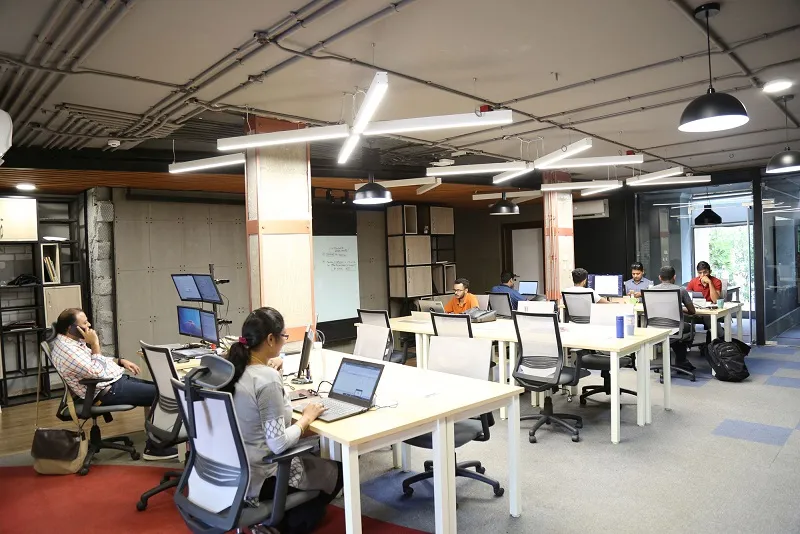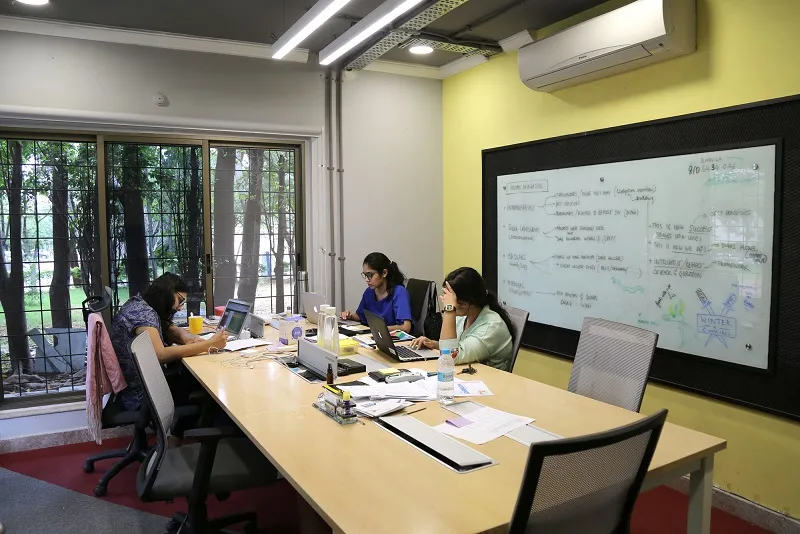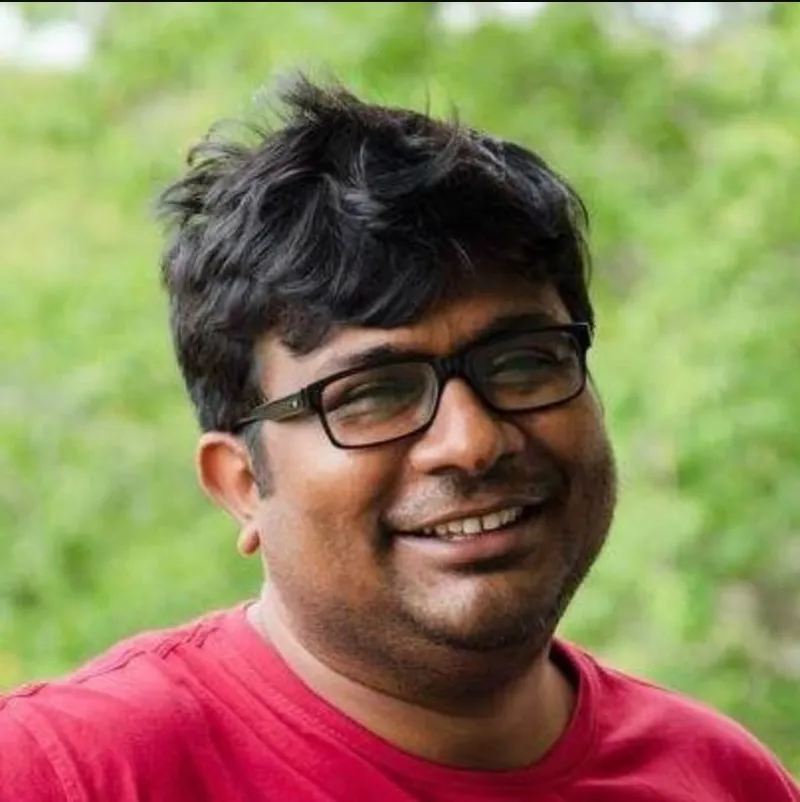Startup opportunities for India’s aspiring founders: How I-Venture @ ISB harnesses local and global talent
In this extended interview with Saumya Kumar, Director, I-Venture @ ISB, we explore how outstanding startups have been incubated and what new opportunities open up in India.
[This article is part of Startup Hatch, a series launched in 2013 by YourStory featuring incubators, accelerators, makerspaces, and coworking spaces in the startup ecosystem. See profiles of initiatives at IIT Bombay, IIM Bangalore, BITS Pilani, NCL, Tata Elxsi, Axilor, NID, IIIT-Bangalore, IIIT-Hyderabad, Vellore Institute of Technology, PSG Coimbatore, Electropreneur Park, Workbench Projects, Makers Asylum, NetApp Excellerator, TechStars, Indigram Labs, WeWork, Z Nation Lab, Sandbox Startups, Brigade REAP, Target India Accelerator, Maersk, Anthill Studio, India Accelerator, UnternehmerTUM, AZO, EXIST, InsurTech Hub Munich, Afthonia Lab, Supreme Incubator, IISC-SID, CoWorks Foundry, and Ashoka Innovators.]
Saumya Kumar is Director, I-Venture @ ISB. An alumnus of the Indian School of Business and winner of the Chairman’s Award for the Best Outgoing Candidate, he has 15 years of experience in ecommerce, banking, insurance, recruitment, and even IT sales. He was part of the founding team of Besthires.ai, an AI-aided recruitment tool. He also works towards building global alliances for ISB’s startups.
I-Venture @ ISB fosters entrepreneurship and nurtures startups via business incubators, multidisciplinary research initiatives, and academic programmes. Launched in 2015, DLabs is the incubation and acceleration arm of the Indian School of Business Hyderabad Campus, set up with support from the Department of Science and Technology, GoI.
Saumya joins us in this extended interview on the role of I-Venture, opportunities for entrepreneurs, pandemic resilience, and plans for the future. Edited excerpts below:

YourStory [YS]: What was the founding vision of I-Venture, and how is it supported?
Saumya Kumar [SK]: I-Venture @ ISB was started with a vision to create a robust entrepreneurship ecosystem in India that is accessible to all entrepreneurs from all corners of our country. Also, we want to encourage women entrepreneurs and entrepreneurs from Tier II and Tier III cities.
We are working in multiple directions to support our vision. One of them is making the knowledge base accessible in all local languages in order to expand our reach. Secondly, alumni are an important pillar of our vision; they become mentors, investors, and co-founders in the wide array of initiatives that we work on.
Finally, we are working on a global corridor. This is especially for startups going abroad from India to explore geographies there, and also for startups from abroad that want to explore the market here in India.
For both these groups of startups, ISB will act as a gateway. The point is to create an impact by not confining our activities to ISB students and alums alone, but everyone across India, including the marginalised population.
[YS]: Which companies have graduated from your incubator so far?
[SK]: Close to 180 startups have been supported by Dlabs to date. Out of these, 125 startups have already graduated. The remaining are currently being supported under various other programs. Some of them are listed below.
Danamojo Online Solutions offers a payment solution and gateway for NGOs. Founded by Dhaval Udani, it enables NGOs to register on the platform by providing all the legal and official registration details of the organisation and embeds the gateway on their website. It charges zero setup fees and simplifies online payments for nonprofits, reducing the overall time, energy, and cost involved in managing donations. Dhaval is the CEO of GiveIndia, which is a marketplace for donations to NGOs.
Femmevista Technologies has developed a global career advancement platform for women talent, called The star in me. Founded by Mahua Mukherjee and Uma Kasoji, it allows women to choose from a variety of career advancement services in one place, instead of searching on multiple channels. The services are provided through a three-sided technology platform that connects women talent, organisations, and vetted service providers.
Sirona Hygiene creates products for feminine health problems. Founded by Deep Bajaj, its catalogue includes products for all problems, right from puberty to menopause. It has products related to menstrual hygiene, disposable toilet covers, wipes, reusable razors, intimate hygiene products, and more.
Evelabs Technologies has developed a smart infusion monitor for hospitals and home care. Founded by Vishnu MS, Sruthy Gopal, and Sanjai Rajendran, the company develops Dripo, a wireless electronic monitor that measures and displays the flow rate in gravity infusions. It shares the data wirelessly, enabling healthcare professionals to set, manage and monitor infusion and the data.
Gramcover is an online comparison platform that allows its users to compare life and non-life insurance policies. Founded by Rishabh Garg, its USP is its rural focus. It offers solutions for health insurance, motor insurance, crop insurance, livestock insurance, and risk advisory services to its stakeholders.
Flic Farm (XMachines) is a robotics and AI company that offers the agri-industry AI-driven robots. It was founded by Trivikram Kumar Dogga, who was concerned about the way agriculture has transformed in the past decade with the over-utilisation of chemicals and gene-modification practices. It is working with a mission to course-correct these agricultural practices and make them sustainable by bringing robotics technologies to farms.
Neuropixel.ai is leveraging cutting-edge AI/ML and computer vision to create a plug-and-play real-time SaaS solution for ecommerce catalogues. Founded by Arvind Nair and Amritendhu Mukherjee, it enables clients to upload a few photographs of the apparel that are taken from different angles, and then generate high-quality catalogue images instantly. This means we get to do away with the operationally-intensive process that involves models, photographers, stylists, make-up artists, editing, and so on. More importantly, this will pave the way for ecommerce cataloguing to go from a simple hygiene tool to a valuable growth-hacking lever.

[YS]: Which startups are currently being incubated?
[SK]: Around 60 startups are currently being incubated at DLabs under various programmes, some of which are listed below.
InsideFPV builds affordable First Person View (FPV) drones. Founded by Arth Chowdary, it provides drones in warranty. Customers can pick the best available component brands in the market and also get free customer drone service.
Infinite Cercle has developed Cerclex, a one-stop SaaS waste transformation platform. Founded by Divya Shetty, the product allows you to pick up waste anywhere across the country within 30 minutes. It also helps transform waste into recycled raw materials/products. An added feature is that you can track the journey of your waste with 100% traceability and transparency.
Heart It Out envisions accessible mental healthcare for 1.5 billion people by 2030 through therapy services, a 24x7 helpline, corporate well-being programmes, and community diagnostics. Founded by Nithya J Rao and Taha Zaidi, its target group includes millennials, companies, and educational institutions. They are currently accessible to five million people in 15 languages. By 2030, this is set to increase to 1.5 billion people in 55 languages.
Monk & Mei has developed Sabyasachi @INR 5099, an affordable option to a designer luxury brand which is responsible and conscious. Founded by Sonia Khatri Anand, it is already loved by 60,000 women and is among the top performers in several categories on Nykaa Fashion with new launches in Pernia’s Pop-Up, Tata Cliq, and Ajio Luxe.

[YS]: Who are the leaders of your incubator?
[SK]: Bhagwan Chowdhry is a Professor of Finance at ISB. He is Executive Director, Digital Identity Research Initiative (DIRI), and Faculty Director, I-Venture @ ISB. He has taught at UCLA Anderson, University of Chicago, the University of Illinois at Chicago, Hong Kong University of Science and Technology, and the Indian School of Business.
His research interests are in international finance, corporate finance, and strategy, topics on which he has published several papers in economic and finance journals. He has organised and taught executive education programmes on financial derivatives, corporate risk management, and valuation in Los Angeles, Singapore, Hong Kong, Mumbai, and Hyderabad.
Professor Chowdhry is also a frequent contributor to the Huffington Post and is the co-founder (with Professor Ivo Welch) and executive editor of a new publication, Finance & Accounting Memos (FAMe), which makes academic research more accessible for MBA and PhD students, journalists, policymakers, and other academics.

Prof. Bhagwan Chowdhry
[YS]: What would you say are the top three opportunities for Indian entrepreneurs?
[SK]: Three industry verticals that we are focusing on and think will hold a lot of opportunity for Indian founders are clean energy, healthtech, blockchain, and decentralised finance.
[YS]: What are the key challenges faced by startups in India, and how can you help bridge the gap?
[SK]: I think the biggest challenge that startups face in India is getting access to the right mentors. A collaborative ecosystem with tech and business mentorship, along with access to explore markets outside the country, is not easy to find.
We are trying to bridge all these three gaps by getting our 13,000+ alums spread across 60 countries and 450 cities, to come together on a single platform to act as mentors, investors and co-founders.
We are tying up with tech institutes both in Mohali and Hyderabad—IIIT Hyderabad, all four campuses of BITS, IIT Ropar, and IIT Mandi—to help our startups whenever they need technical support.
We are also building corridors in different geographies with help from our partner schools in the US, UK, Europe, and Singapore to enable startups on both sides to explore markets and customers.

[YS]: What are the unique challenges for social entrepreneurs compared to tech or profit-led enterprises?
[SK]: Social entrepreneurs, in particular, find it difficult to get access to grants and focused guidance. They also find it challenging to scale their products and services as compared to other entrepreneurs because a large chunk of their efforts goes into working at the grassroot, tackling problems that are arising at the community level while focusing on creating mindset change and driving social change as a whole.
[YS]: What are the selection criteria for startups in your incubator?
[SK]: We support startups at different stages, as described below.
Ideation: We have programmes that focus on founders who just have an idea and nothing else. They apply to the ISPROUTE programme. The applicants have to pitch their ideas to a committee which shortlists the ones they think are good. The shortlisted ideas are accepted into the programme and the founders spend 6-8 months with us before they are ready to incorporate their company and pitch to investors.
Early-stage: We have government grants from Startup India and DST which we use to support startups that are not older than two years from the date of incorporation. They apply to our incubator and if shortlisted, they pitch to a committee. Once selected, we incubate them and give them some grant money as mandated by GOI. We help them with all the services that are needed to get them ready for the market.
Growth-stage: This is for startups that already have a product they are selling, along with customers on board, and also some revenue that they are generating. We take 1% equity and give them tailored services that will help them scale and refine their product-market fit.

[YS]: Who are some of your institutional partners, and what kinds of agreements are in place?
[SK]: We have partners like IIIT Hyderabad, BITS PILANI, Swissnex, Toronto Business Development Corporation, University of Twente, VC Partners, T-Hub, Startup India, AIM, DST, OneValley, Letsventure, Mumbai Angels, and FalconX, to name a few.
We also have an MoU with most of the institutions that provide various services to these startups. These include funding, legal, HR, go-to-market help, digital marketing, to help in a soft landing, and figuring out markets outside India.
[YS]: What support and services do startups receive in your incubator?
[SK]:
- Business strategy: Business strategy, branding and marketing strategy, go-to-market strategy, business expansion strategy, technology commercialisation.
- Legal support: Company incorporation and documentation, intellectual property (IP), patenting, regulatory compliance, partnerships, and agreements documentation.
- Funding support: Loans, seed capital, grants, angel investors, venture capitalists, investor pitching.
- Financial services: Accounting, filings, valuations, investment management.
- Connections and networking: mentor connect, investor connect, industry partners connect, government connects, higher education institutions connections.
- International linkages: International exchange programmes, collaborations, and partnerships with foreign entities.
- Infrastructure: Access to the best available makers lab facilities and other product development lab facilities from our partners, world-class plug-and-play office facilities, and networking spaces.
- Human resources: Hiring of interns and freshers, team management, partners fit.

Team I-Connect @ ISB
[YS]: What percentage of equity do you take in your startups?
[SK]: We take 1% equity from startups that want our services. This is only if they get selected after they apply to our rolling cohort incubation programme.
[YS]: What kinds of IP are being created by your startups?
[SK]: We have 20+ patents filed by the startups to date.
[YS]: How would you differentiate your incubator from the others in the field?
[SK]: There are a lot of incubators that claim to have cracked the mentorship problem and created an ecosystem by collaborating with different institutes to create seamless access to services that startups can benefit from. This is not true.
Most of them are just claims. I am not saying we have cracked it either but we are committed to it and have created working partnerships with different institutions and entities which help startups get solutions to their problems.
We also provide access to markets in different geographies where we have our partner school incubators helping us, e.g., the US, UK, Singapore, and the Netherlands.

Saumya Kumar
[YS]: What are some challenges you face, and how do you plan to overcome them?
[SK]: Keeping the mentors interested and engaged is a challenge, though we have been largely successful in solving this. We have dedicated a team that engages 24x7 with the mentors and keeps them connected with the startups.
We have seen instances where the mentors and the startups get along so well that the scope of the relationship they had started with, starts to become limiting. If both parties are fine with it, then we even let them get mentor equity or any form of engagement outside of our contract. This keeps both sides more engaged.
[YS]: What would you define as success for your incubator?
[SK]: I think if 80% of our startups can raise Series A funding, that is a success for me. When they raise Series A, that’s when we know we have succeeded in making them independent.
They have been “incubated” and are now ready to scale their products. We help them from time to time, and design engagements depending on what they need help with.
[YS]: What are some notable startups who have graduated from your incubator, and what are their achievements?
[SK]: Danamojo Online Solutions reported Rs 72 lakh as revenue in 2020. Started in 2016, it has over 900 NGOs and non-profits onboard, and is steadily growing. Its investors include Social Alpha and Venture Garage.
Sirona Hygiene reported revenue of $3.2 million in 2020, up from $1.78M in the calendar year 2019. It has been growing at a CAGR of 140% for the last three years and has been profitable since 2019. In a recent funding round, it received Rs 100 crore from Good Glamm Group, which also saw a secondary buyout with early investors including seed and angel investors.
Neuropixel.ai Labs has paid pilots signed with Indian Terrain, StyliShop (UAE-based fashion portal), and Udaan. It has had CXO-level discussions with Myntra and Zivame, and will close them as soon as their product is ready. It also has Namshi, a Dubai-based ecommerce platform in the pipeline. They have already raised close to a million dollars in investments and are looking toward raising the next round of funding.
[YS]: How do you compare and contrast India’s incubators with that of other countries like China?
[SK]: Most of the incubators in China are privately owned. Less than 15% are owned by the government. In India, this is a little different.
Most of the incubators here are government sponsored and a lot of support is being provided through various structured channels that assist startups at all stages. The government of India also has a big role in the kind of grassroots innovation we are now experiencing in India.

[YS]: What are your plans for the coming 3-5 years with respect to new startups?
[SK]: In the next 3-5 years we plan to build a robust and functioning ecosystem of tech institutes, mentors, investment partners, and working labs so that we are able to build prototypes and become the most significant name in the country for startups to explore markets outside India.
[YS]: What challenges has COVID-19 posed for Indian startups? And at the same time, what new opportunities are opening up?
[SK]: The biggest challenge during COVID-19 was that startups could not be physically present at incubation centres and they had to operate remotely. Some of them were quite far from their customers as well.
But this also made us realise that working remotely will be the norm, so we started reaching out to startups to enrol for our services in Tier II and Tier III cities and start working remotely to get their first few customers.
Now we are an incubator that has startups coming from all Tier II and III cities and we are looking to build our content for all our startups in regional languages as well.

[YS]: How can better partnerships be forged between incubators, industry, and universities?
[SK]: We have to realise that none of us can do this alone. Each one of us has complimentary skills and we all need to come together for startups to realise their full potential. We have to bring together incubators, industries, and universities at a local level first.
The government needs to build these clusters locally and mandate that every incubator have industry leaders as well as university faculty on their board. They will spend a stipulated number of hours to help these startups get funding from the government. Unless this is mandated, and also incentivised, this will be difficult to achieve.
[YS]: What are your recommendations for Indian policymakers to make business easier for incubators, investors, researchers and startups in India?
[SK]: To begin with, we have to make it easy for founders to start and incorporate a company. Even closing down a business needs to be made easier than it is, because many startups fail.
We also have to ensure that innovators who miss certain regulatory guidelines because they are not aware of them, are not penalised. We hear from founders that they are being harassed by some authorities because they missed a payment that they were not even aware of.
Regulations need to be made more founder-friendly.
[YS]: What are your recommendations or words of inspiration to the startups and entrepreneurs in our audience?
[SK]: We need to move away from the mindset of being job seekers. We have to become job creators. India's next phase of growth is going to come from the innovations that startup founders will bring. The time is right and we are well poised to ride this wave of innovation.
(This story was updated after adding captions to the images.)
Edited by Saheli Sen Gupta



![[Year in Review 2021] Top ten changemakers of the year](https://images.yourstory.com/cs/5/79900dd0d91311e8a16045a90309d734/collage1-1639488579193.png?fm=png&auto=format&h=100&w=100&crop=entropy&fit=crop)
![[Year in Review 2021] Amid COVID-19, these 10 non-profits created social impact this year](https://images.yourstory.com/cs/5/79900dd0d91311e8a16045a90309d734/collage-1640102486726.png?fm=png&auto=format&h=100&w=100&crop=entropy&fit=crop)
![[Year in Review 2021] Meet the top 10 techies we celebrated this year](https://images.yourstory.com/cs/2/b87effd06a6611e9ad333f8a4777438f/collage4-1639196680900.png?fm=png&auto=format&h=100&w=100&crop=entropy&fit=crop)
![[Year in Review 2021] Times are changing as women in tech reach new heights](https://images.yourstory.com/cs/4/bf6cd6001f6d11ec9f7c8d775ba8e1d7/women-tech-leader-1640501582312.png?fm=png&auto=format&h=100&w=100&crop=entropy&fit=crop)

![[Year in Review] Meet these Indian women who used social media to drive change and social impact](https://images.yourstory.com/cs/4/211ccaf00e6d11e997fe8f165dce9bb1/NewDesigncopy14-1640700625660.png?fm=png&auto=format&h=100&w=100&crop=entropy&fit=crop)





